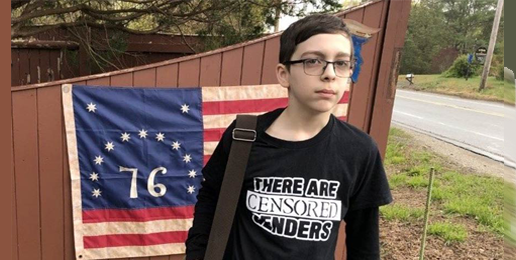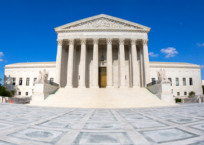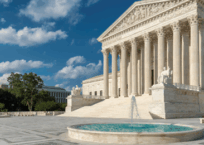
On May 27th, the cowardly United States Supreme Court (i.e., government) again failed to secure the God-given rights of its People.
Put simply, the lower courts in this case, L.M. v. Middleborough, robbed a student (but really all of The People) of a long established fundamental right, and the U.S. Supreme Court is obligated to restore it.
Here is a digest of Justice Samuel Alito‘s own account of the facts in dissent [and I commend to all The People, who do not need a lawyer or a judge to understand their Constitutional and God-given liberties, reading the entire brief opinion]:
In March 2023 Petitioner was a seventh grader at Nichols Middle School in Middleborough, Massachusetts. Inside and outside the classroom, the school promotes the view that gender is a fluid construct and that a person’s self-defined identity—not biological sex—determines whether that person is male, female, or something else. The school also encourages [1] students to embrace and express this viewpoint, including during the school’s “PRIDE Spirit Week.”
Petitioner, however, sees things differently. His understanding of basic biology has led him to believe that there are only two sexes, male and female, and that a person’s gender is inextricably tied to sex. Petitioner is not alone in this regard. Several of his peers take issue with the school’s position on questions of human identity, sex, and gender, but they remain silent due to the social consequences of disagreeing with the school’s authority figures.
To register his dissent and start a dialogue on the topic, Petitioner wore a shirt to school that read, “There Are Only Two Genders.” But the school censored petitioner’s speech no sooner than it started. The school principal removed petitioner from his first-period gym class after a teacher called to report the shirt and told him that he could not return to class unless he changed clothes. He declined, so he was sent home.
A week and a half later, Petitioner’s father emailed the superintendent questioning the school’s actions.
Frustrated that he was not allowed to express his views on an issue of personal and national concern—especially when other students and school officials routinely espouse the opposite position during school hours—Petitioner protested this censorship by wearing a shirt blocking out the words “Only Two” and substituting “CENSORED,” reading, “There Are CENSORED Genders.”
But this shirt fared no better. Moments after Petitioner arrived to his first class, he was summoned to the principal’s office and told that the “CENSORED” shirt was also banned. Rather than miss another day of school, petitioner acquiesced and changed clothes.
The U.S. Supreme Court should not be allowed discretion to deny a ruling on lower court decisions which remove and endanger certain, unalienable, God-given (also referred to as “fundamental’) rights of The People. It is the Court’s duty to rightly rule on all such matters according to the U.S. Constitution.
The dissenting opinion also makes clear that lower courts are divided [2] on how to apply this “bedrock constitutional safeguard,” which, as expressed by Alito, “underscores the pressing need for clarification.” In this case, that safeguard is removed, which “robs a great many students of that core First Amendment protection.”
Alito therefore passionately states that, the First Circuit’s decision “calls out for our review.”
“The lower courts in this case erred, and badly so,” say the dissenters. The long-established understanding, “at the very heart of the First Amendment” is that the government is almost [3] never allowed to enforce viewpoint-based restrictions on speech (e.g., students may express the viewpoint of gender fluidity, but they may not express the viewpoint of fixed gender).
The First Circuit has effectively legislated a novel and new rule, in conflict with long-established understanding of the courts, permitting the government to prohibit legitimate free and appropriate political speech by the People.
The U.S. Supreme Court is obligated to correct this.
Again, only the two justices “CENSORED” in the headline, Samuel Alito and Clarence Thomas, have the courage to do their duty as U.S. Supreme Court Justices.
The reader may recall that the same two Justices were the only two who had the courage to stand in Texas v. Pennsylvania, et al. (Alito asserted in this case challenging unlawful counting of swing state votes in the 2020 Presidential Election, that the Court did “not have discretion to deny” the complaint. See last entry, December 11, 2020, under Proceedings and Orders).
Refusing to hear this case is an abuse of discretion and dereliction of the very essence of the duties, known in this instance as checks and balances, for which U.S. Supreme Court Justices are appointed.
Congress has for many years neglected its Constitutional responsibility to check the federal courts, including the U.S. Supreme Court, including impeachment, limitation of jurisdiction, and rejection of nominees with ideology incompatible with the oath to “support and defend the Constitution of the United States against all enemies foreign and domestic.”[4]
We must hold the federal courts accountable once again for securing God-given rights to the people under the Constitution.
Footnotes:
[1] According to Justice Alito’s Dissent, joined by Justice Thomas, Petitioner’s father cited a social-media post by the school featuring a student wearing a shirt reading, “HE SHE THEY IT’S ALL OKAY”.
[2] Zamecnik v. Indian Prairie School Dist. No. 204, 636 F. 3d 874, 875 (CA7 2011) (upholding a student’s right to wear a shirt that read, “Be Happy, Not Gay”); Nuxoll v. Indian Prairie School Dist. No. 204, 523 F. 3d 668, 670 (CA7 2008) (same); Sypniewski v. Warren Hills Regional Bd. of Educ., 307 F. 3d 243, 246 (CA3 2002) (upholding a student’s right to wear a shirt “inscribed with ‘redneck’ jokes”); see also Harper ex rel. Harper v. Poway Unified School Dist., 445 F. 3d 1166, 1171 (CA9 2006) (upholding a school’s ban of a shirt that read, “HOMOSEXUALITY IS SHAMEFUL”), vacated as moot, 549 U. S. 1262 (2007); Parents Defending Education v. Olentangy Local School Dist. Bd. of Educ., 109 F. 4th 453, 464 (CA6) (holding that a school could satisfy Tinker’s material-disruption standard by relying on “common-sense conclusions based on human experience” to punish students for the “dehumanizing and humiliating effects of non-preferred pronouns” (internal quotation marks omitted)), reh’g en banc granted, 120 F. 4th 536 (CA6 2024), as well as this case, upholding a school’s ban.
[3] Also noted by the dissent “Indeed, the presumption against viewpoint discrimination is of such importance to our constitutional order that we have even applied it to categories of speech—like fighting words—that do not enjoy full First Amendment protection. See R. A. V. v. St. Paul, 505 U. S. 377, 391 (1992). So, for example, Congress could ban all fighting words, but it could not ban only those fighting words directed toward Protestants.”
[4] https://www.fjc.gov/history/judges/impeachments-federal-judges






















